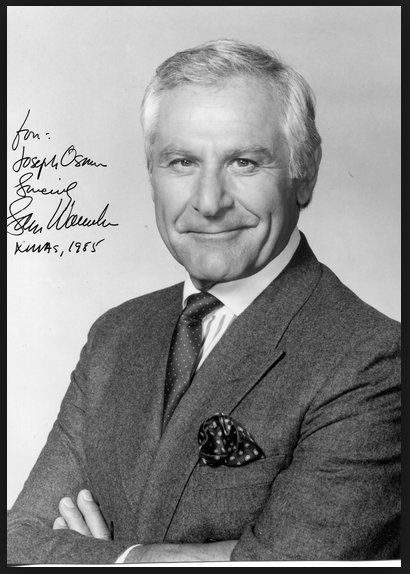

Obituary: Sam Wanamaker by NICK SMURTHWAITE The Independent, Monday 20 December 1993 [Text only - photo is from another source] Samuel Wanamaker, actor, director and producer: born Chicago 14 June 1919; CBE 1993; married 1940 Charlotte Holland (three daughters); died London 18 December 1993. If Sam Wanamaker wasn't as famous or acclaimed an actor as he might have been, he only had himself to blame. Or rather, his obsession. For over 20 years he poured the lion's share of his considerable energy into recreating Shakespeare's wooden 'O', the Globe Theatre, on London's south bank. Born in Chicago in 1919, Wanamaker had a dogged entrepreneurial zeal that was often mistaken for American excess in the London theatrical establishment, especially since he was always aware of the commercial imperatives attendant upon his dream to rebuild the Globe. The need to make it a going concern was seen by many as thinly veiled Disneyism. What his detractors often forgot was that Wanamaker was a genuine Shakespearean enthusiast, man and boy. Appropriately, his debut in Shakespeare was in a plywood and paper replica of the Globe at the Chicago World Fair in 1934, when he appeared as a teenager in condensed versions of the Bard's greatest hits. Wanamaker was 23 when he first played Broadway in Cafe Crown in 1942. The following year he was called up and spent the next three years doing his US military duty. Returning to the theatre in 1946, he took on a succession of headstrong juvenile leads in long-forgotten plays. What he hankered after was classical theatre of the kind that flourished in England. To this end he created the Festival Repertory Theatre in New York in 1950. Two years later, by now blacklisted by Senator McCarthy's Commie-bashers, he came to London to join Laurence Olivier's company at the St James's Theatre, playing alongside Michael Redgrave in Winter Journey, which he also directed. One of the first things he did on arriving in London was to seek out the site of Shakespeare's Globe. Instead of the elaborate memorial he'd always imagined, Wanamaker found a dirty plaque fixed to the wall of a Courage brewery bottling plant in a particularly drab Southwark back street. From 1953 to 1960 he produced and acted in plays in London and the provinces, creating the New Shakespeare Theatre in Liverpool, where his productions included A View From the Bridge, The Rose Tattoo, The Rainmaker and Bus Stop. Another American play, The Big Knife by Clifford Odets, was a personal success for Wanamaker as actor-director at the Duke of York's in 1954. Perhaps his outstanding performance of this period, certainly the one for which he is best remembered, was Iago to Paul Robeson's Othello in Tony Richardson's 1959 production at Stratford. [Photo of this production is at the bottom of this webpage.] He first tackled opera in 1962, Tippett's King Priam, twice revived at Covent Garden. Wanamaker later admitted he relied on others better acquainted with operatic production to tell him what to do, including the composer himself, 'who kept laughing, patting me on the back and telling me not to worry'. Later that year his radical reinvention of Verdi's La Forza del Destino caused a sensation at Covent Garden, and led to many other operatic offers, including, much later, the opening production at Sydney Opera House, Prokofiev's War and Peace. In 1977 he returned to Covent Garden to produce the premiere of Tippett's The Ice Break. Wanamaker's track record shows a commendable lack of cultural elitism. He would happily go from producing Verdi to playing a cameo in a Goldie Hawn film (Private Benjamin, 1980), or directing an episode of Hawaii Five-0 (1978). He thrived on diversity and contrast, the more challenging the better. Though there were some memorable screen roles in Those Magnificent Men in their Flying Machines (1964), The Spy Who Came In from the Cold (1966), the 1978 television mini-series Holocaust and, most recently, Guilty by Suspicion (1991) with Robert De Niro, Wanamaker never took film seriously enough to claim the first- division status that was his due. From the late 1960s his colleagues in almost every job he undertook were regaled, like it or not, with the latest chapter in the Globe saga, which sometimes seemed as if it would never reach its climax. From the moment he first presented the Architectural Association with a model of the Globe he had had made at Shepperton Studios in 1969, Wanamaker was a man with a mission - to create an international focus for the study and celebration of Shakespeare. He found a staunch ally in Theo Crosby, who became chief architect of the scheme, sharing Wanamaker's determination to make it both commercially viable (since government subsidy always seemed unlikely) and true to the Spartan style of its 16th-century blueprint - hard wooden benches, no heating, no amplification, and no roof to cover the hole in the middle. Over two decades of fund-raising and bureaucratic battles, Wanamaker's missionary zeal was stretched to the limit, mostly by the left-wingers of Southwark Council, who tried to sabotage what they saw as indulgent elitism by claiming the Globe site back for council housing. The matter was finally settled in court, where Wanamaker's contention that the Globe project would bring employment to many and regeneration to a notably depressed area of London finally won the day. By the late 1980s the Globe had beaten off its chief adversaries, and become virtually unassailable thanks to the patronage of the Duke of Edinburgh, Ronald Reagan, Michael Caine, Dustin Hoffman and a host of other victims of Wanamaker's persuasive powers. No longer was he perceived as the cranky Yank building castles in the air; despite an unfavourable economic climate and constantly escalating costs, the Globe really would be rebuilt and Wanamaker's dream vindicated. In more recent years, the quest for funds took him, appropriately, all over the globe, shored up by his commitment to posterity and the firm belief that there was, just around the next corner, that elusive crock of gold. The first bays of the Globe Theatre were unveiled this year. It is scheduled to open for business in April 1995. 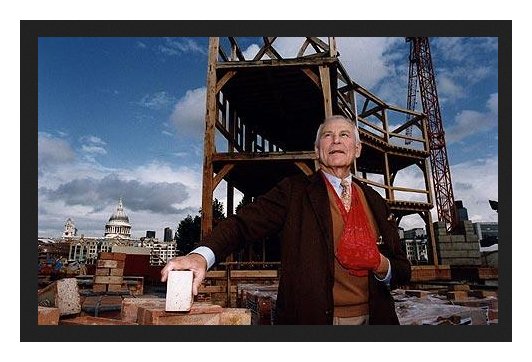
|
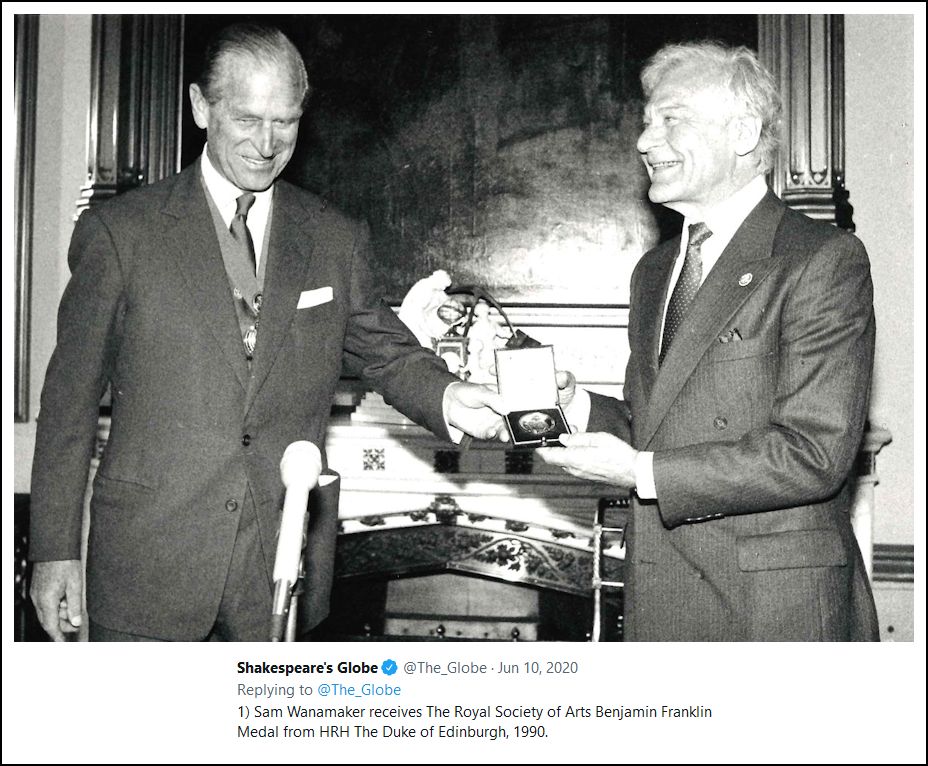
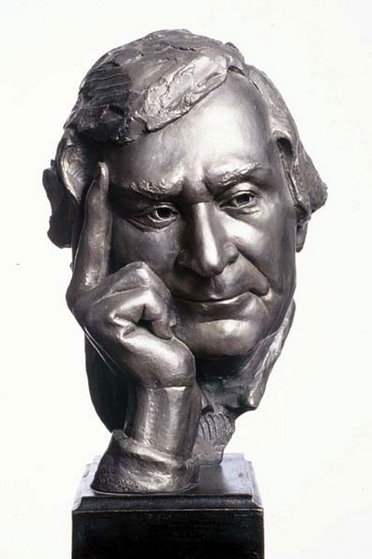 SW: Well, some might say both, of course!
[Both laugh] But it depends on what that relationship is. In
my own experience I have worked with authors of original productions, and
would have preliminary meetings with that person before we began. I
was happy to carry on with it, and I suppose the writer, too, had to be assured
that the director he was getting wasn’t going to distort his play.
So it was a common objective to try and understand each other and the material
before you actually commit to doing it with each other, and in most cases
it works out very well. In some cases there are disagreements, and
they’re either resolved happily or they’re resolved unhappily, or they’re
not resolved at all!
SW: Well, some might say both, of course!
[Both laugh] But it depends on what that relationship is. In
my own experience I have worked with authors of original productions, and
would have preliminary meetings with that person before we began. I
was happy to carry on with it, and I suppose the writer, too, had to be assured
that the director he was getting wasn’t going to distort his play.
So it was a common objective to try and understand each other and the material
before you actually commit to doing it with each other, and in most cases
it works out very well. In some cases there are disagreements, and
they’re either resolved happily or they’re resolved unhappily, or they’re
not resolved at all!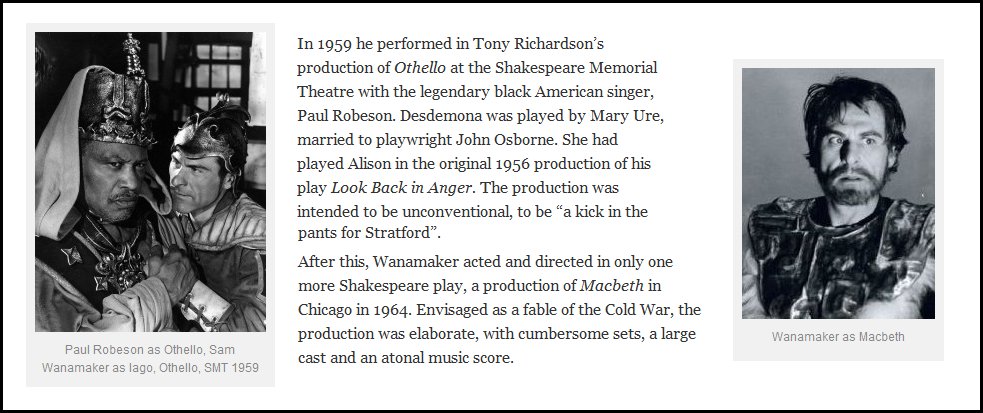
|
[The following is from PlayShakespeare.com
(text only - photo is from another source)]
Elizabethan Theatres
The Globe Theatre The original Globe was an Elizabethan theatre which opened in Autumn 1599 in Southwark, on the south bank of the Thames, in an area now known as Bankside. It was one of several major theatres that were located in the area, the others being the Swan, the Rose and The Hope. The Globe was the principal playhouse of the Lord Chamberlain's Men (who would become the King's Men in 1603). Most of Shakespeare's post-1599 plays were staged at the Globe, including Julius Caesar, Macbeth, Othello, King Lear and Hamlet. The Globe was owned by many actors, who (except for one) were also shareholders in the Lord Chamberlain's Men. Two of the six Globe shareholders, Richard Burbage and his brother Cuthbert Burbage, owned double shares of the whole, or 25% each; the other four men, Shakespeare, John Heminges, Augustine Phillips, and Thomas Pope, owned a single share, or 12.5%. (Originally William Kempe was intended to be the seventh partner, but he sold out his share to the four minority sharers, leaving them with more than the originally planned 10%). These initial proportions changed over time, as new sharers were added. Shakespeare's share diminished from 1/8 to 1/14, or roughly 7%, over the course of his career. The Globe was built in 1599 using timber from an earlier theatre, The Theatre, that had been built by Richard Burbage's father, James Burbage, in Shoreditch in 1576. The Burbages originally had a 20-year lease of the site on which the Theatre was built. When the lease ran out, they dismantled The Theatre beam by beam and transported it over the Thames to reconstruct it as The Globe. On June 29, 1613, the Globe Theatre went up in flames during a performance of Henry the Eighth. A theatrical cannon, set off during the performance, misfired, igniting the wooden beams and thatching. According to one of the few surviving documents of the event, no one was hurt except a man who put out his burning breeches with a bottle of ale. Like all the other theatres in London, the Globe was closed down by the Puritans in 1642. It was destroyed in 1644 to make room for tenements. Its exact location remained unknown until remnants of its foundations were discovered in 1989 beneath the car park of Anchor Terrace on Park Street (the shape of the foundations are replicated in the surface of the car park). There may be further remains beneath Anchor Terrace, but the 18th century terrace is listed and therefore cannot be disturbed by archaeologists. Layout of the Globe The Globe's actual dimensions are unknown, but its shape and size can be approximated from scholarly inquiry over the last two centuries. The evidence suggests that it was a three-story, open-air amphitheatre between 97 and 102 feet (29.6 - 31.1M) in diameter that could house up to 3,000 spectators. The Globe is shown as round on Wenceslas Hollar's sketch of the building, later incorporated into his engraved "Long View" of London in 1647. However, in 1997-98, the uncovering of a small part of the Globe's foundation suggested that it was a polygon of 20 (or possibly 18) sides. At the base of the stage, there was an area called the pit, (or, harking back to the old inn-yards, yard) where, for a penny, people (the "groundlings") would stand to watch the performance. Groundlings would eat hazelnuts during performances — during the excavation of the Globe nutshells were found preserved in the dirt — or oranges. Around the yard were three levels of stadium-style seats, which were more expensive than standing room A rectangular stage platform, also known as an 'apron stage', thrust out into the middle of the open-air yard. The stage measured approximately 43 feet (13.1m) in width, 27 feet (8.2m) in depth and was raised about 5 feet (1.52m) off the ground. On this stage, there was a trap door for use by performers to enter from the "cellarage" area beneath the stage. There may have been other trap doors around the stage. Large columns on either side of the stage supported a roof over the rear portion of the stage. The ceiling under this roof was called the "heavens," and may have been painted with clouds and the sky. A trap door in the heavens enabled performers to descend using some form of rope and harness. The back wall of the stage had two or three doors on the main level, with a curtained inner stage in the center and a balcony above it. The doors entered into the "tiring house" (backstage area) where the actors dressed and awaited their entrances. The balcony housed the musicians and could also be used for scenes requiring an upper space, such as the balcony scene in Romeo and Juliet. The modern Globe 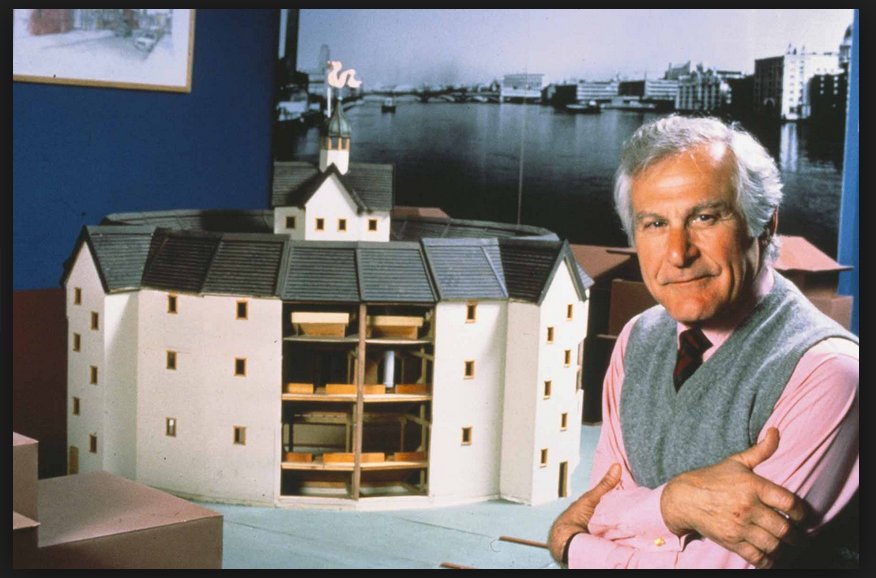
At the instigation of American actor and director Sam Wanamaker, a new Globe theatre was built according to an Elizabethan plan. The design team comprised Theo Crosby of Pentagram as the architect, Buro Happold as structural and services engineers and Boyden & Co as quantity surveyors. It opened in 1997 under the name "Shakespeare's Globe Theatre" and now stages plays every summer (May to October). Mark Rylance was appointed as the first artistic director of the modern Globe in 1995. In 2006, Dominic Dromgoole took over. The new theatre on Bankside is approximately 225 yards (205m) from the original site, centre to centre, and was the first thatched roof building permitted in London since the Great Fire of London in 1666. As in the original Globe, the theatre is open to the sky and has a thrust stage that projects into a large circular yard surrounded by three tiers of steeply raked seating. 700 tickets to stand (and you must stand, no sitting allowed) in the yard are available for every performance at 5 pounds each. The only covered parts of the amphitheatre are the stage and the (more expensive) seated areas. Plays are put on during the summer, usually between May and the first week of October. In the winter the theatre is used for educational purposes. Tours are available all year round. The reconstruction was carefully researched so that the new building would be as faithful a replica as possible. This was aided by the discovery as final plans were being made of the site of the original Globe itself. Modernisations include the addition of sprinklers on the roof to protect against fire, and the fact that the theatre is partly joined onto a modern lobby, visitors centre and additional backstage support areas. Due to modern Health and Safety regulations 1,300 people can be housed during a show, under half the estimated 3,000 of Shakespeare's time. 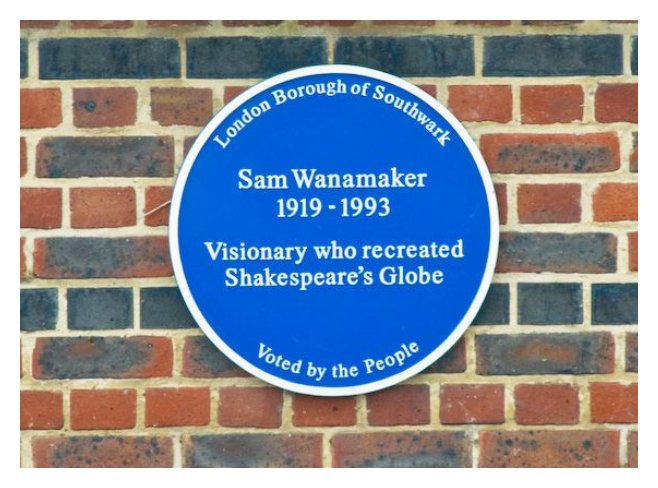
Replicas Globe-Theater, Schwäbisch Hall, Baden-Württemberg, Germany A number of conjectural replicas or free interpretations of the Globe have been built around the world: U.S.A. OSF Elizabethan Theatre, Ashland, Oregon, built in 1935, rebuilt 1947 and 1959 San Diego, Old Globe Theatre, built in 1935 Cedar City, Utah, Adams Shakespearean Theatre Chicago, Illinois, Chicago Shakespeare Theatre on Navy Pier, built 1999 Dallas, Texas, Old Globe Theatre, built 1936 Odessa, Texas, The Globe Theatre Of The Great Southwest Williamsburg, Virginia, Globe Theatre, built 1975 in the Banbury Cross section of Busch Gardens Europe Germany Neuss am Rhein, Globe Neuss, built 1991 Rust, Baden, Germany (in German), Europa-Park (in German), built 2000 Schwäbisch Hall, Baden-Württemberg Italy Rome, built 2003 Czech Republic Prague, built 1999, burned down in 2005 Japan Tokyo, Isozakia Arata's Panasonic Globe Theatre in Tokyo, built 1988 Replica of similar Elizabethan theatre: Waseda University Tsubouchi Shoyo Memorial Library Theatre (a replica of The Fortune Theatre), built early 1900s Copyright © 2014 by PlayShakespeare.com. |
© 1992 Bruce Duffie
This conversation was recorded at his hotel in Chicago on September 18, 1992. Portions were broadcast on WNIB the following year. This transcription was made in 2015, and posted on this website at that time. My thanks to British soprano Una Barry for her help in preparing this website presentation.
To see a full list (with links) of interviews which have been transcribed and posted on this website, click here.
Award - winning broadcaster Bruce Duffie was with WNIB, Classical 97 in Chicago from 1975 until its final moment as a classical station in February of 2001. His interviews have also appeared in various magazines and journals since 1980, and he now continues his broadcast series on WNUR-FM, as well as on Contemporary Classical Internet Radio.
You are invited to visit his website for more information about his work, including selected transcripts of other interviews, plus a full list of his guests. He would also like to call your attention to the photos and information about his grandfather, who was a pioneer in the automotive field more than a century ago. You may also send him E-Mail with comments, questions and suggestions.